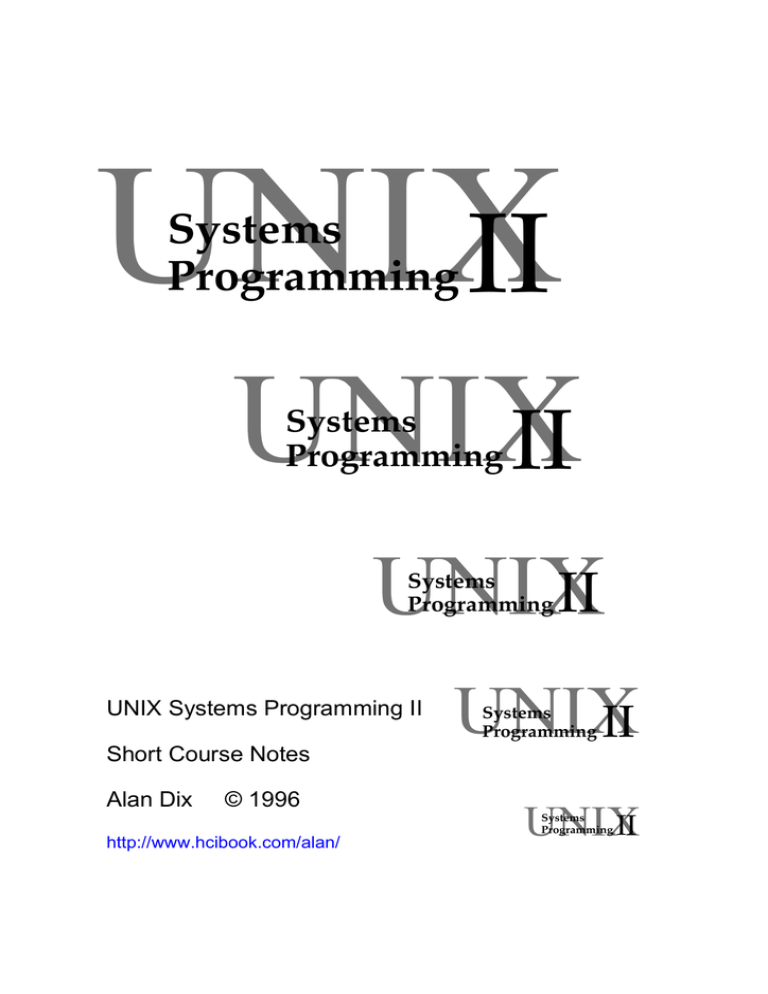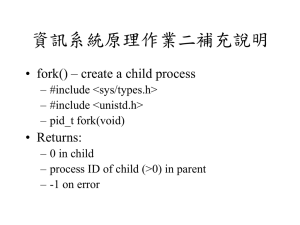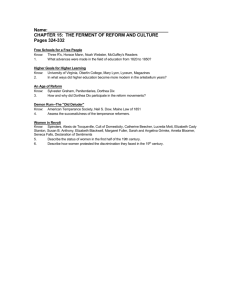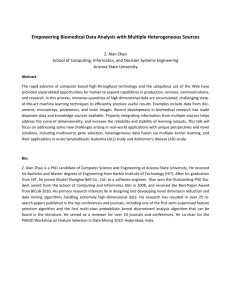UNIX II
advertisement

UNIX
II
Systems
Programming
UNIX
II
Systems
Programming
II
UNIX
Systems
Programming
UNIX Systems Programming II
Short Course Notes
Alan Dix
© 1996
http://www.hcibook.com/alan/
UNIX
II
Systems
Programming
II
UNIX
Systems
Programming
Course
Outline
UNIX
II
Systems
Programming
Alan Dix
http://www.hcibook.com/alan/
Session 1
files and devices
inodes, stat, /dev files, ioctl,
reading directories,
file descriptor sharing and dup2,
locking and network caching
Session 2
process handling
UNIX processes, fork, exec,
process death: SIGCHLD and
kill and I/O issues for fork
Session 3
inter-process
communication
pipes: at the shell , in C code and
use with exec, pseudo-terminals,
sockets and deadlock avoidance
Session 4
non-blocking I/O and
select
UNIX events: signals, times and
I/O; setting timers, polling, select,
interaction with signals and an
example Internet server
UNIXII
Systems
Programming
Short Course Notes
wait,
Alan Dix © 1996
II/ i
UNIX
II
Reading
Systems
Programming
¥ The Unix V Environment,
Stephen R. Bourne,
Wiley, 1987, ISBN 0 201 18484 2
The author of the Borne Shell! A 'classic' which deals with system
calls, the shell and other aspects of UNIX.
¥ Unix For Programmers and Users,
Graham Glass,
Prentice-Hall, 1993, ISBN 0 13 061771 7
Slightly more recent book also covering shell and C programming.
Ì BEWARE Ð
UNIX systems differ in details,
check on-line documentation
¥ UNIX manual pages:
man creat
etc.
Most of the system calls and functions are in section 2 and 3 of the
manual. The pages are useful once you get used to reading them!
¥ The include files themselves
/usr/include/time.h
etc.
Takes even more getting used to, but the ultimate reference to
structures and definitions on your system.
UNIXII
Systems
Programming
Short Course Notes
Alan Dix © 1996
II/ ii
UNIX
II
Systems
Programming
Session 1
files and devices
¥ inodes
¥ stat
¥ /dev
¥ special devices
¥ ioctl, fnctl
¥ directories
¥ file descriptors and dup2
¥ locking and network problems
☞ a simple ls
UNIXII
Systems
Programming
Short Course Notes
Alan Dix © 1996
II/ 1
UNIX
UNIX filesystem:
❍
disk (partition)
❍
directories
❍
mount points
❍
special files
0
1
2
...
579
580
581
582
UNIXII
Systems
Programming
...
filesystem
Ð
Ð
Ð
Ð
inode table (file contents)
maps names to files
links between disks
e.g. /dev, /n
directory
580
.
0
..
tom 582
2
fred
hd2
Short Course Notes
Alan Dix © 1996
II/ 2
inodes
¥
each disk has an inode table
❍
¥
inode contains
❍
❍
❍
❍
¥
permissions: read/write/execute
other flags: directory, symbolic link, setuid
times: creation, modification, access
pointers to disk blocks containing file
directories
❍
❍
¥
one inode for each file on the disk
of the form:
filename → inode number
no other information Ð all in the inode
hard link:
❍
❍
UNIXII
Systems
Programming
two names → same inode number
when safe to delete?
Short Course Notes
Alan Dix © 1996
II/ 3
inode reference counts
¥
inode has count of number of links
¥
unlink system call does two things:
①
②
remove directory entry
subtract 1 from link count
¥
when count is zero safe to delete file
. . . or is it?
✘
what about open files?
❍ file disappears
❍ program does read/write
❍ disaster
✓
UNIX also keeps in-memory reference count
❍ only deleted when both are zero
❍
UNIXII
Systems
Programming
last close to the file → file finally disappears
Short Course Notes
Alan Dix © 1996
II/ 4
stat system call
#include <sys/types.h>
#include <sys/stat.h>
struct stat buf
int res = stat(filename,&buf );
¥
gets information for the file pointed to by filename
¥
all the inode information
¥
in addition device information
❍
device number (which disk)
inode number
❍
¥
inode information includes:
❍
mode
Ð
buf.st_mode
❍
size
Ð
buf.st_size
❍
owner
Ð
buf.st_uid
❍
block size
Ð
buf.st_blksize
❍
number of links Ð
buf.st_nlink
❍
update time
Ð
buf.st_mtime
¥
can also get/set mode using chmod
UNIXII
Systems
Programming
Short Course Notes
Alan Dix © 1996
II/ 5
stat – 2
¥
variants of stat:
lstat(filename,&buf)
❍
❍
same except for symbolic links
gives info for link rather than target
fstat(fd,&buf)
❍
❍
gives info for open file descriptor
useful for standard input/output
¥
mode flags Ð buf.st_mode
❍
permissions
❍
file type
¥
can test mode flags using bit operations
if (buf.st_mode & S_IWUSR ) . . .
Ð
user has write permission?
¥
also macros for file types, including:
S_ISDIR(buf.st_mode)
S_ISREG(buf.st_mode)
S_ISLNK(buf.st_mode)
UNIXII
Systems
Programming
Short Course Notes
Ð
Ð
Ð
directory
regular file
symbolic link
Alan Dix © 1996
II/ 6
/dev
¥
UNIX makes everything look like a file!
¥
many physical devices appear in /dev
❍
❍
❍
¥
/dev/hd??
/dev/fd??
/dev/s??
Ð
Ð
Ð
hard disk
floppy disk
serial port
in addition, many logical devices
❍
/dev/tty
Ð
❍
❍
/dev/win??
/dev/pty??
/dev/tty??
/dev/kmem
/dev/null
Ð
the terminal for this
process
windows
Ð
Ð
Ð
pseudo-terminals
kernel memory
empty source, infinite sink
❍
❍
¥
logical devices may be system wide
e.g. pseudo-terminals
¥
or different for each process
e.g. /dev/tty
UNIXII
Systems
Programming
Short Course Notes
Alan Dix © 1996
II/ 7
special files/devices
¥
logical and physical devices of two kinds:
❍
❍
¥
character special files
❍
¥
when it is reasonable to think of the device
as a sequence of bytes
e.g. serial port
block special files
❍
❍
¥
character special
block special
when it is reasonable to think of the device
as a sequence of blocks of bytes
e.g. formatted disk
get the block size right!
some physical devices have both
❍
❍
UNIXII
Systems
Programming
hard disk
high level
Ð
low level
Ð
different semantics
Short Course Notes
block special
character special
Alan Dix © 1996
II/ 8
ioctl system call
¥ all devices appear as files . . .
. . . equal but different !
¥ ioctl system call allows device specific control
int res = ioctl(fd, cmd, arg );
int fd
Ð
int cmd
Ð
caddr_t arg; Ð
file descriptor to control
command/request to perform
data structure to use/fill
¥ nature of requests depend on device
❍
see section 4 of manual for device specific requests
filio
Ð
general ÔfileÕ requests
termio
terminal requests
sockio
socket requests (e.g. TCP/IP)
¥ type of argument depends on request
❍
read description of request in manual page
¥ argument may supply data and/or be used for result
¥ some device specific wrapper functions:
stty/gtty
Ð
terminal drivers
fcntl
Ð
ÔfilesÕ (not just disk)
UNIXII
Systems
Programming
Short Course Notes
Alan Dix © 1996
II/ 9
ioctl – examples
¥ close on exec
#include <sys/filio.h>
ioctl(fd,FIOCLEX,NULL);
¥ donÕt block on read/write
#include <sys/filio.h>
int flag = 1;
ioctl(fd,FIONBIO,&flag);
¥ get terminal window size
e.g. under X when windows may resize
#include <sys/termios.h>
struct winsize wsz;
ioctl(fd,TIOCGWINSZ,&wsz);
UNIXII
Systems
Programming
Short Course Notes
Alan Dix © 1996 II/ 10
fcntl system call
#include <sys/filio.h>
#include <unistd.h>
#include <fcntl.h>
int res = fcntl(fd, cmd, arg );
int fd
int cmd
int arg;
Ð
Ð
Ð
file descriptor to control
command/request to perform
argument
purports to be an int
but is often a pointer!
¥
performs operations on open file descriptors
¥
similar to ioctl, with some overlap
¥
some requests cause ioctl to be called
¥
others cannot be performed with ioctl
¥
N.B.
UNIXII
Systems
Programming
(e.g. locks)
argument purports to be an int . . .
. . . but is often a pointer!
Short Course Notes
Alan Dix © 1996 II/ 11
directories
¥ stored as ordinary file
❍
sequence of bytes
¥ inode entry says it is a directory
¥ can be accessed using ordinary read
✘ only if you know the format!!
⇒ special library functions
❍
read the directory
❍
put it in a data structure
UNIXII
Systems
Programming
Short Course Notes
Alan Dix © 1996 II/ 12
reading directories
#include <dirent.h>
opendir, readdir, closdir,
seekdir, telldir, rewinddir
¥
the directory functions in man(3)
❍
like a stdio for directories
❍
functions to open, read, and close
❍
but not write - that is creat!
❍
also ÔseekÕ and ÔtellÕ style functions
¥
data structures
❍
DIR structure takes the place of FILE*
❍
read returns a pointer to a struct dirent
❍
only important field is d_name Ð the file name
#include <dirent.h>
struct dirent *dp;
DIR *dirp = opendir("testdir");
dp = readdir(dirp);
while ( dp != NULL ) {
printf("%s\n",dp->d_name);
dp = readdir(dirp);
}
closedir(dirp);
UNIXII
Systems
Programming
Short Course Notes
Alan Dix © 1996 II/ 13
shared file descriptors
¥ file descriptors
❍
point to shared structures
¥ shared:
① within a process
② between processes
¥ arises from:
① dup2/dup2 system calls
② fork system call
¥ shared means
❍ same file pointer
writes
reads
❍
Ð
Ð
last close matters
files
Ð
network Ð
UNIXII
Systems
Programming
sequenced
first come / first served
Short Course Notes
may be deleted
connection broken
Alan Dix © 1996 II/ 14
dup2 system call
int res = dup2(old_fd, new_fd);
¥ makes new_fd point to same file/stream as old_fd
¥ new_fd is closed if already open
¥ most often used with standard I/O descriptors:
dup2(fd,0);
Ð standard input reads from fd
¥ can close the old descriptor
. . . but new descriptor still works
dup2(fd,0);
close(fd):
n = read(0,buff,buff_len);
¥ negative return on failure
UNIXII
Systems
Programming
Short Course Notes
Alan Dix © 1996 II/ 15
locks
¥
lots of processes accessing the same file
⇒ trouble!
¥
locks prevent multiple access
❍
atomic Ð
cannot have half a lock
❍
mutual exclusion
Ð
at most one process has the lock
¥
traditional UNIX lock file:
❍
❍
❍
use creat to make an unreadable file
creat("lockfile",0);
subsequent calls to creat will fail
(because creat on an existing file acts as an open)
when done use creat to delete lock file
✓
uses ordinary UNIX file handling
Ð no special locking mechanism needed
✘
fails with network file systems
UNIXII
Systems
Programming
Short Course Notes
Alan Dix © 1996 II/ 16
network files – NFS
¥
files stored on one or more servers
¥
remote files accessed by sending network messages
¥
simply sendUNIX open/read/write requests?
✘ too much network traffic
✘ too much server state
¥
NFS:
✔ client workstations cache files
✔ server is stateless (⇒ no open)
¥
some files donÕt last long
⇒ donÕt tell server about every creat/write
periodic synchronisation
¥
some files donÕt last long
⇒ donÕt tell server about every creat/write
periodic synchronisation
✘
creat only mutually exclusive on each machine
✘
odd anomalies with read/write
UNIXII
Systems
Programming
Short Course Notes
Alan Dix © 1996 II/ 17
flock and the lock daemon
#include <sys/file.h>
int res = flock(fd,op);
int fd
int op
Ð
Ð
an open file descriptor
a locking operation
¥
locking operation one of:
LOCK_SH Ð
shared lock
(mainly for read)
LOCK_EX Ð
exclusive lock
(mainly for write)
LOCK_UN Ð
release lock (unlock)
¥
if file is already locked
❍
normally flock blocks until it is free
❍
can or operation with LOCK_NB
⇒ never blocks Ð error return instead
¥
how does it work
❍
background process lockd on each machine
❍
they handle the shared state
✔
only have shared state when necessary
✘
still insecure Ð locks are advisory
❍
process can ignore it and open a locked file
UNIXII
Systems
Programming
Short Course Notes
Alan Dix © 1996 II/ 18
☞ ☞ ☞ ☞
Hands on
✍ ✍ ✍ ✍
☞
copy the code fragment on the directory slide
to write a Ômini-lsÕ program
☞
it should list the file pointed to by its program first
argument (argv[1])
☞
compile and run it
☞
now modify it to use stat on each file
☞
get it to add a slash Õ/Õ to the end of directories
☞
use your imagination to add other status info!
☞
compile and run again
☞
if you have time, try adding a Ô-LÕ option
when the Ô-LÕ option is given, your program
should give the details of symbolic links themselves
as the Ô-LÕ option does for the real ls
UNIXII
Systems
Programming
Short Course Notes
Alan Dix © 1996 II/ 19
UNIX
II
Systems
Programming
Session 2
process handling
¥ UNIX processes and forking
¥ fork system call
¥ exec system call
¥ death of process
¥ kill
¥ fork and I/O
☞ using it
UNIXII
Systems
Programming
Short Course Notes
Alan Dix © 1996 II/ 20
A UNIX process
UNIX process:
¥ identified by process id (pid)
¥ process includes:
❍ program code
❍ application data
❍ system data
❋ including file descriptors
pid = 597
code
data
system data
e.g. file descriptors
UNIXII
Systems
Programming
Short Course Notes
Alan Dix © 1996 II/ 21
Forking
UNIX 'fork' duplicates process:
¥ copies complete process state:
program data + system data
including file descriptors
❍
❍
¥ code immutable Ð shared
597
632
code
code
data
data
system data
system data
$ echo $$
597
$ (echo $$)
632
$
UNIXII
Systems
Programming
Short Course Notes
Alan Dix © 1996 II/ 22
Forking – 2
¥ old process called the parent
¥ new process called the child
¥ process ids
❍ allocated sequentially
❍ so effectively unique
(but do wrap after a very long time)
¥ finding process ids
❍ at the shell prompt:
use 'ps'
❍ in a C program:
use 'int p = getpid();'
❍ in a shell script:
use '$$'
N.B. useful for naming temporary files:
tmpfile = "/tmp/myfile$$"
UNIXII
Systems
Programming
Short Course Notes
Alan Dix © 1996 II/ 23
Fork system call
pid_t p = fork();
( pid_t ≈
int )
¥ if successful
❍ process
❍ successful fork returns:
0
Ð to child process
child pid Ð to parent process
⇒ parent and child are different!
¥ negative result on failure
UNIXII
Systems
Programming
Short Course Notes
Alan Dix © 1996 II/ 24
Execution – 1
¥ parent forks
597
➡
DATA
int i = 3, c_pid = -1;
c_pid = fork();
if ( c_pid == 0 )
printf("child\n");
else if ( c_pid > 0 )
printf("parent\n");
else
printf("failed\n");
i=3
c_pid = -1
¥ after fork parent and child identical
597
➡
DATA
632
int i = 3, c_pid = -1;
c_pid = fork();
if ( c_pid == 0 )
printf("child\n");
else if ( c_pid > 0 )
printf("parent\n");
else
printf("failed\n");
➡
DATA
i=3
c_pid = 632
int i = 3, c_pid = -1;
c_pid = fork();
if ( c_pid == 0 )
printf("child\n");
else if ( c_pid > 0 )
printf("parent\n");
else
printf("failed\n");
i=3
c_pid = 0
¥ except for the return value of fork
UNIXII
Systems
Programming
Short Course Notes
Alan Dix © 1996 II/ 25
Execution – 2
¥ because data are different
597
➡
DATA
632
int i = 3, c_pid = -1;
c_pid = fork();
if ( c_pid == 0 )
printf("child\n");
else if ( c_pid > 0 )
printf("parent\n");
else
printf("failed\n");
➡
DATA
i=3
c_pid = 632
int i = 3, c_pid = -1;
c_pid = fork();
if ( c_pid == 0 )
printf("child\n");
else if ( c_pid > 0 )
printf("parent\n");
else
printf("failed\n");
i=3
c_pid = 0
¥ program execution differs
597
➡
DATA
632
int i = 3, c_pid = -1;
c_pid = fork();
if ( c_pid == 0 )
printf("child\n");
else if ( c_pid > 0 )
printf("parent\n");
else
printf("failed\n");
➡
DATA
i=3
c_pid = 632
int i = 3, c_pid = -1;
c_pid = fork();
if ( c_pid == 0 )
printf("child\n");
else if ( c_pid > 0 )
printf("parent\n");
else
printf("failed\n");
i=3
c_pid = 0
¥ so parent and child behaviour diverge
UNIXII
Systems
Programming
Short Course Notes
Alan Dix © 1996 II/ 26
exec system call
execv(char *prog, char **argv);
¥ replaces the current process with prog
¥ never returns except on failure
¥ argv is passed to the 'main' of prog
N.B. needs at least argv[0] set to program name
¥ new process:
❍ code
Ð
❍ data
Ð
❍ system data Ð
❇
replaced by prog
reinitialised
partly retained
file descriptors still open
¥ several variants (execl, execvp, . . . )
¥ often used after fork to spawn a fresh program
UNIXII
Systems
Programming
Short Course Notes
Alan Dix © 1996 II/ 27
exec vs. fork
¥ fork duplicates process
¥ exec replaces process
597
493
code
code
data
data
system
system
fork
597
exec
632
493
code
code
code
data
data
data
system
system
system
¥ fork child shares open file descriptors
¥ exec-ed process retains open fds
UNIXII
Systems
Programming
Short Course Notes
Alan Dix © 1996 II/ 28
death of a forked process
¥ when parent dies
❍ children become orphans !
❍ system init process 'adopts' them
¥ when child dies
❍ parent (or init) informed by signal
( SIGCHLD )
❍
❍
child process partly destroyed
rump retained until parent 'reaps'
Ð using wait or wait3 system call
❍
until then child is 'zombie'
Ð
N.B.
UNIXII
Systems
Programming
ps says <exiting> or
<defunct>
zombie state necessary so parent
can discover which child died
Short Course Notes
Alan Dix © 1996 II/ 29
wait
¥ if parent does not reap children
. . . they stay zombies forever
. . . system resources may run out
¥ reap using variants of wait
union wait status;
int pid = wait(status);
❍
block until a child has died
return pid of deceased child
int sysv(char *prog,char **argv)
{
union wait status;
int pid = fork();
if ( pid < 0 ) return -1;
if ( pid == 0 ) execvp(prog,argv);
if ( wait(&status) != pid ) return -1;
return 0;
}
¥ wait3 similar, but with more options
UNIXII
Systems
Programming
Short Course Notes
Alan Dix © 1996 II/ 30
SIGCHLD
& wait3
¥ wait blocks
✘ no good for concurrent execution
✔ SIGCHILD says when child has died
① first catch your signal
signal(SIGCHLD,my_reaper);
¥ function 'my_reaper' called when signal arrives
② then reap a child
int my_reaper()
{
union wait status;
while( wait3(&status,WNOHANG,NULL) >= 0 );
}
¥ use WNOHANG so that wait3 doesn't block
¥ loop to reap multiple children
UNIXII
Systems
Programming
Short Course Notes
Alan Dix © 1996 II/ 31
kill system call
int kill(int pid, int sig);
¥ sends the signal sig to process pid
¥ target process Ð pid
❍
❍
❍
must have same effective user id
(usually launched by same user)
super user programs can kill anyone!
special case: pid == -1
⇒ broadcast (kill nearly everyone)
donÕt worry Ð super user only
¥ kill?
❍
❍
only kills the process if it is not caught
(using signal system call)
but some signals can never be caught
¥ self-destruct
❍
UNIXII
Systems
Programming
a process can send signals to itself!
Short Course Notes
Alan Dix © 1996 II/ 32
fork and I/O
low-level I/O
¥ open file descriptors shared so:
❍ output is merged
❍ input goes to first read
Ð accept similar
❍ close down may be delayed
until all processes close fd
⇒ close all unwanted fds
or use ioctl to set close-on-exec
high-level I/O
¥ C stdio is buffered:
❍ duplicated at fork
❍ may get flushed after fork
⇒ duplicate writes
✓ stderr OK Ð unbuffered
⇒ careful with stdio
use stderr or setbuff(fd,NULL)
UNIXII
Systems
Programming
Short Course Notes
Alan Dix © 1996 II/ 33
☞ ☞ ☞
³ Hands on ³
✍ ✍ ✍
☞
look at the program fork-test.c in prog2
check you understand how it works
☞
copy it into your directory and compile and run it
☞
write a test program for the sysv function on the
wait slide
☞
get it to run /bin/cat on a test file
the argv structure you pass to sysv will look
something like this:
static char *ex_argv[3] = {
"cat",
"tom",
NULL };
☞
try redirecting the output by opening a file and then
using dup2:
int fd = open( "dick", O_WRONLY | O_CREAT );
dup2(fd,1);
UNIXII
Systems
Programming
Short Course Notes
Alan Dix © 1996 II/ 34
UNIX
II
Systems
Programming
Session 3
inter-process
communication
¥ shell pipes
¥ building pipes
¥ psuedo-terminals
¥ sockets
¥ socket I/O and deadlock
☞ using it
UNIXII
Systems
Programming
Short Course Notes
Alan Dix © 1996
II/ 35
IPC
¥ processes may need to communicate
Ð inter-process communication (IPC)
¥ different circumstances:
❍ local machine or over network?
❍ forked from single process?
❍ terminal handling required?
¥ different mechanisms:
❍ pipes
Ð local, forked
no terminal handler
❍ pseudo-terminals
Ð local, not necessarily forked
terminal handler
❍ sockets
Ð remote (e.g. TCP/IP)
no terminal handler
UNIXII
Systems
Programming
Short Course Notes
Alan Dix © 1996
II/ 36
shell pipes
¥ UNIX shell pipes join
the standard output of one command
to the standard input of another
$ head -5 fred | cut -c1-10
¥ commands run at the same time
¥ standard error from both are mixed together (!)
'fred'
head -5
col -c1-10
output
errors
¥ shell pipes are a special case of a general mechanism
¥ DOS has pipes too . . .
. . . but just a shorthand for hidden temporary files!
UNIXII
Systems
Programming
Short Course Notes
Alan Dix © 1996
II/ 37
pipe system call
int p[2];
int res = pipe(p);
¥ returns a pair of file descriptors
¥ connected: p[1] → p[0]
Ð any data written to p[1] . . .
. . . appears as input to p[0]
¥ buffered within operating system
¥ initially connects process to itself
int p[2], res, n;
char buff[100]
res = pipe(p);
write(p[1],"hello world",11);
n = read(p[0],buff,100);
write(1,buff,n);
¥ not particularly useful!
UNIXII
Systems
Programming
Short Course Notes
Alan Dix © 1996
II/ 38
linking processes with pipes
¥
pipe cannot be used to link existing processes
¥ but can link process as they fork
¥ uses the fact that forked file descriptors are shared
① use pipe system call to link process to itself
process
p[1] p[0]
OS buffer
② use fork Ð file descriptors shared
⇒ both parent and child can:
read from p[0] and write to p[1]
process
fork
p[1] p[0]
child
p[1] p[0]
OS buffer
UNIXII
Systems
Programming
Short Course Notes
Alan Dix © 1996
II/ 39
linking with pipes – 2
③ one side closes p[0] and the other closes p[1]
process
child
p[1] p[0]
p[1] p[0]
OS buffer
④ now the two processes can communicate
process
child
p[1]
p[0]
OS buffer
Note:
¥ buffer full
⇒ write(p[1] ...) will block
¥ buffer empty
⇒ read(p[0] ...) will block
¥ p[1] closed and buffer empty
⇒ read(p[0] ...) returns 0
(end of file)
UNIXII
Systems
Programming
Short Course Notes
Alan Dix © 1996
II/ 40
piping to and from programs
¥ typical use of pipe:
❍
pipe created between parent and child
(stages ① to ④)
❍
child uses dup2 to connect p[0] to stdin
❍
child execs another program ÒXÓ
❍
output of parent (through p[1])
→ standard input of X
¥ child code:
close(p[1]);
dup2(p[0],0);
close(p[0]);
/* output side
*/
/* still open as 0 */
exec("X");
¥ alternatively:
❍
❍
UNIXII
Systems
Programming
parent retains input side of pipe p[0]
child connects output side to standard output
⇒ parent captures program output
open two pipes for both
Short Course Notes
Alan Dix © 1996
II/ 41
pseudo-terminals
¥ some programs need a terminal
e.g. screen editors
or behave differently with pipes
e.g. ls on Berkeley based UNIX
¥ pseudo-terminals:
❍
❍
have terminal driver between end-points
allow remote processes to connect
¥ uses:
❍
❍
window managers
remote logins over network
network
client
server
/dev
remote terminal
UNIXII
Systems
Programming
shell
pseudo-terminal
Short Course Notes
Alan Dix © 1996
II/ 42
pseudo-terminals – 2
¥ special ÔvirtualÕ devices in /dev
¥ in pairs
❍
❍
/dev/ttyp[a-z][0-9]
/dev/ptyp[a-z][0-9]
Ð
Ð
slave end
controller end
¥ connection
❍
❍
❍
output to /dev/ttyp??
→ input of corresponding /dev/ptyp??
output to /dev/ptyp??
→ input of corresponding /dev/ttyp??
both liable to transformation by tty driver
¥ asymmetry
❍
/dev/ttyp??
Ð
❍
/dev/ptyp??
Ð
UNIXII
Systems
Programming
behaves like the computer end of a tty
including stty options
behaves like the user end of a tty
Short Course Notes
Alan Dix © 1996
II/ 43
opening pseudo-terminals
¥ use normal open system call
❍
control end program
int fd = open("/dev/ptypb7",2);
❍
slave end program
int tty_fd = open("/dev/ttypb7",2);
¥ full-duplex connection
Ð can read or write to either end
¥ finding a pseudo-terminal
❍
❍
UNIXII
Systems
Programming
control end often ÔfishesÕ
Ð
tries to open each pty in turn
how does the other process know which tty?
Ð
often forked after fishing (just like pipes!)
Ð
other form of IPC
Short Course Notes
Alan Dix © 1996
II/ 44
sockets
¥ generic connection mechanism
❍
❍
networks:
local:
e.g. Internet (TCP/IP)
e.g. UNIX domain ÔsocketpairÕ
¥ roots
❍
original Berkeley TCP/IP implementation
¥ features
❍
❍
❍
❍
central abstraction - the socket - an end-point
like an electrical connector
uses normal read/write system calls
sockets associated with UNIX file descriptors
but some not for normal I/O
some extra system calls
especially fot TCP/IP
¥ normally bi-directional
❍
?
✔
UNIXII
Systems
Programming
read and write to same file descriptor
close one direction
special socket call shutdown(sock,dir)
Short Course Notes
Alan Dix © 1996
II/ 45
socketpair system call
¥ the simplest sockets have no network connection
int s[2];
int res = socketpair(s,AF_UNIX,SOCK_STREAM);
¥ returns a pair of sockets (file descriptors)
¥ like pipes, but both bidirectional: s[1] ↔ s[0]
int s[2], res, n;
char buff[100]
res = socketpair(s,AF_UNIX,SOCK_STREAM);
write(s[1],"one way",7);
n = read(s[0],buff,100);
write(1,buff,n);
write(s[0],"and back again",14);
n = read(s[1],buff,100);
write(1,buff,n);
¥ again use fork to establish connected processes
¥ in fact pipe now implemented using socketpair
UNIXII
Systems
Programming
Short Course Notes
Alan Dix © 1996
II/ 46
read & write with sockets
¥ pipes and pseudo-terminals similar
¥ reading may block
❍
❍
reading from a file either:
(i) succeeds
(ii) gets end of file (ret = 0)
reading from a socket waits until
(i) (network) data received (ret > 0)
(ii) connection closed (ret = 0)
(iii) network error (ret < 0)
¥ writing may block
❍
❍
❍
✘
writing to a socket may
(i) send to the network (ret > 0)
(ii) find connection is closed (ret = 0)
(iii) network error (ret < 0)
it may return instantly
but may block if buffers are full
BEWARE Ð
may work during testing
(sufficient buffer space)
then fail in use
(block and deadlock when buffers full)
UNIXII
Systems
Programming
Short Course Notes
Alan Dix © 1996
II/ 47
deadlock
¥ cycles of pipes/sockets can deadlock
process 1
process 2
buffer
buffer
buffer
process 3
¥ OK so long as buffers donÕt fill up
¥ if everyone writes faster then they read
everyone waits for everyone else!
¥ duplex channels similar
⇒ donÕt use blocking I/O
UNIXII
Systems
Programming
Short Course Notes
Alan Dix © 1996
II/ 48
☞ ☞ ☞ ☞
Hands on
✍ ✍ ✍ ✍
☞
write a test program that Ôtalks to itselfÕ using a
pipe, as in the example code on the pipe system call
slide
☞
do a similar a test with a socket pair
☞
you are all logged on to the same machine, so
should be able to communicate using pseudoterminals
☞
try it from the shell; one of you types:
cat >/dev/ttypn
(for some suitably chosen n!)
and the other types:
cat </dev/ptypn
have a nice chat!:
☞
what happens if you try doing the cats in the
opposite order?
☞
if there is time, try using fork, exec and pipe to
perform the equivalent of the shell command:
ls /dev | head -30
UNIXII
Systems
Programming
Short Course Notes
Alan Dix © 1996
II/ 49
UNIX
II
Systems
Programming
Session 4
non-blocking I/O
and select
¥ UNIX events
¥ setting timers
¥ polling
¥ select system call
¥ signals and select
☞ proxy server
UNIXII
Systems
Programming
Short Course Notes
Alan Dix © 1996
II/ 50
UNIX Events
Computational programs:
¥ busy most of the time
¥ read/write when they are ready
Interactive programs:
¥ servers & clients
¥ idle most of the time
¥ respond to events
UNIX processes Ð 4 types of event
① signal (interrupt)
② time (alarm)
③ input ready
read will not block
④ output can accept (more) data
write will not block
UNIXII
Systems
Programming
Short Course Notes
Alan Dix © 1996
II/ 51
Responding to events
Events:
① signal (interrupt)
② time (alarm)
③ input (read) ready
④ output (write) ready
Responding
¥ interrupt handler Ð ①&②
use signal system call
use setitimer to send SIGALRM
¥ turntaking Ð ②,③&④
call read/write when ready
use sleep for delays
¥ polling Ð ②,③&④
use non-blocking read/write
use time to do things at specific times
¥ wait for several events
use select system call
timeout or SIGALRM
UNIXII
Systems
Programming
Short Course Notes
Alan Dix © 1996
II/ 52
setting timers
¥
processes in UNIX have ÔtimersÕ
❍ exactly 3 of them (why 3?!)
❍ like private alarm clocks
❍ precision of milliseconds . . .
. . . but not accuracy!
¥
two datatypes
struct timeval {
Ð single time
long tv_sec;
Ð in seconds
long tv_usec;
Ð and milliseconds
}
struct itimerval {
struct timeval it_interval; Ð period of timer
struct timeval it_value;
Ð next alarm
}
N.B. it_interval == 0 ⇒ only one alarm
¥
setting a timer
struct itimerval value, oldvalue;
int which;
int res = setitimer(which, &value, &oldvalue);
¥
which says which timer to use (an int)
¥
when timer expires, process sent SIGALRM
¥
read a timer with getitimer(which, &value);
UNIXII
Systems
Programming
Short Course Notes
Alan Dix © 1996
II/ 53
polling in UNIX
#include <sys/filio.h>
int flag = 1;
ioctl(fd,FIONBIO,&flag);
¥ call to ioctl tells system:
donÕt block on read/write
¥ polling therefore possible
¥ structure of polling telnet-like client:
int flag = 1;
ioctl(tty_fd,FIONBIO,&flag);
ioctl(net_fd,FIONBIO,&flag);
for(;;) {
/* any terminal input? */
n = read(tty_fd,buff,buff_len);
if ( n > 0 ) { /* yes! do something */ }
/* any network input? */
n = read(net_fd,buff,buff_len);
if ( n > 0 ) { /* yes! do something */ }
}
UNIXII
Systems
Programming
Short Course Notes
Alan Dix © 1996
II/ 54
polling pros and cons
✔ program is Ôin controlÕ
✔ similar to normal programs
(i.e. non-interactive programs)
✘ busy polling consumes CPU time
✔ put a sleep in the loop
int flag = 1;
ioctl(tty_fd,FIONBIO,&flag);
ioctl(net_fd,FIONBIO,&flag);
for(;;) {
n = read(tty_fd,buff,buff_len);
if ( n > 0 ) { /* do something */ }
n = read(net_fd,buff,buff_len);
if ( n > 0 ) { /* do something */ }
sleep(5);
}
✘ kills interactive performance
✔ OK if fast response not critical
(e.g. no user interaction)
UNIXII
Systems
Programming
Short Course Notes
Alan Dix © 1996
II/ 55
read & write
read:
¥ waits on one file descriptor
¥ returns when input data is ready
¥ and reads the data into a buffer
read(0,buff,len)
write:
¥ waits on one file descriptor
¥ returns when output is possible
¥ and writes the data from the buffer
write(1,buff,len)
UNIXII
Systems
Programming
Short Course Notes
Alan Dix © 1996
II/ 56
select
select:
¥
¥
¥
+
waits on many file descriptor
returns when input or output ready
but does no actual I/O
also allows timeout
ì
select(width,&in_fds,&out_fds,&err_fds,&timeout)
UNIXII
Systems
Programming
Short Course Notes
Alan Dix © 1996
II/ 57
select system call – 2
int ret =
select(size,&in_fds,&out_fds,&err_fds,&timeout);
¥
in_fds, out_fds:
Ð
Ð
❍
in_fds
❍
out_fds Ð
bitmaps of file descriptors
wait for input
i.e. read will not block
wait for output
i.e. write will not block
¥
size:
Ð
size of in_fds, out_fds, err_fds
¥
timeout:
Ð
when to timeout
in seconds and milliseconds
Returns when:
¥ input ready on one of in_fds
¥ output ready on one of out_fds
¥ error occurs on one of err_fds
¥ timeout expires
¥ signal has been caught
¥ some other error occurs
(ret
(ret
(ret
(ret
(ret
(ret
UNIXII
Alan Dix © 1996
Systems
Programming
Short Course Notes
> 0)
> 0)
> 0)
== 0)
< 0)
< 0)
II/ 58
select and I/O
#include <sys/types.h>
fd_set in_fds, out_fds, err_fds
¥ modified by call:
call
Ð bit set = wait for file desc
return Ð bit set = file desc ready
return value from select
= number ready
¥ long integer in early UNIX systems
in_fds = in_fds || ( 1<<fd );
⇒
limit of 32 file descriptors
. . . but some systems allow more
¥ now a special fd_set structure
actually an array of integers!
❍ setting:
FD_ZERO( &in_fds );
FD_SET( fd, &in_fds );
FD_CLR( fd, &in_fds );
❍
testing:
if ( FD_ISSET(fd,&in_fds) ) ...
UNIXII
Systems
Programming
Short Course Notes
Alan Dix © 1996
II/ 59
select and I/O – 2
¥ input
❍ terminal/socket
Ð read will not block
❍ passive socket
Ð accept will not block
¥ output
❍ terminal/socket
Ð write ÔreadyÕ
❍ write relies on system resources
❍ change between select and write?
⇒ write may block
❄
use non-blocking write
¥ can Ôget awayÕ without select on write
. . . but dangerous!
UNIXII
Systems
Programming
Short Course Notes
Alan Dix © 1996
II/ 60
select and timeouts
#include <sys/time.h>
struct timeval timeout;
¥
timeout.tv_secs
timeout.tv_ms
Ð
¥
maximum time to wait in seconds and ms
if no I/O ready and no signals in time limit
then select returns with zero result
N.B. in_fds, out_fds, err_fds all zero also
¥
modified by call?
❍
❍
⇒
UNIXII
Systems
Programming
ideally should return time remaining
doesnÕt now . . .
. . . but may do one day
donÕt rely on timeout not being changed
reset for each call to select
Short Course Notes
Alan Dix © 1996
II/ 61
select and signals
¥ signal occurs during system call:
read, write, or select
¥ signal not caught . . .
. . . process aborts!
¥ signal caught . . .
① relevant handler called
② systems call returns with ÔerrorÕ
¥ how do you know?
❍ negative return value
❍ errno set to EINTR
¥ negative return & errno ≠ EINTR
⇒ really an error!
UNIXII
Systems
Programming
Short Course Notes
Alan Dix © 1996
II/ 62
example – proxy server
¥ proxy server
❍
monitors Internet traffic to and from server
network
client
proxy
server
¥ structure of code
①
②
③
UNIXII
Systems
Programming
wait for client connection
connect to remote Internet server
loop forever
waiting for client or server input:
❍ when client data ready
read it
send to server
echo it to terminal
❍ when server data ready
read it
send to client
echo it to terminal
Short Course Notes
Alan Dix © 1996
II/ 63
proxy code – 1
➀
Main loop
main(...) {
/* establish port
port_sk = tcp_passive_open(port);
/* wait for client to connect
client_sk = tcp_accept(port_sk);
/* only want one client,
/* so close port_sk
close(port_sk);
*/
*/
*/
*/
/* now connect to remote server
*/
serv_sk = tcp_active_open(rem_host,rem_port);
ret = do_proxy( client_sk, serv_sk );
exit(0);
}
¥
basically sets up network connections
and then calls do_proxy
UNIXII
Systems
Programming
Short Course Notes
Alan Dix © 1996
II/ 64
proxy code – 2
②
perform proxy loop
int do_proxy( int client_sk, int serv_sk )
{
¥ first declare and initialise fd bitmaps
fd_set read_fds, write_fds, ex_fds;
FD_ZERO(&read_fds); FD_ZERO(&write_fds);
FD_ZERO(&ex_fds);
FD_SET(client_sk,&read_fds);
FD_SET(serv_sk ,&read_fds);
¥ then loop forever
for(;;) {
int
num, len;
¥ copy bitmaps because select modifies them
fd_set read_copy =
fd_set write_copy =
fd_set ex_copy
=
static struct timeval
read_fds;
write_fds;
ex_fds;
timeout = {0,0};
¥ then call select
num = select(MAX_FD, &read_copy, &write_copy,
&ex_copy, &timeout);
➥ check return Ð ③, ④ & ⑤ at this point
}
return 0;
}
UNIXII
Systems
Programming
Short Course Notes
Alan Dix © 1996
II/ 65
proxy code – 3
③
check for signals, errors and timeout
¥ first check for signals:
in this case, we are not expecting any so return
in general, we may need to do some processing
following the interrupt
it is usually better for the interrupt to set some
flag and let the main loop do most of the work
this reduces the risk of stacked interrupts and
mistakes in concurrent access to data structures
if (num < 0 && errno == EINTR ) {
/* stopped by signal */
perror("EINTR"); return 1;
}
¥ if there has been no signal num < 0 is an error
if (num < 0 ) {
/* not stopped by signal */
perror("select"); return 1;
}
¥ if num is zero then a timeout has occurred
again, in this case no processing
but in general this is the opportunity for animation
or other periodic activity
if ( num == 0 ) continue;
UNIXII
Systems
Programming
Short Course Notes
/* timeout */
Alan Dix © 1996
II/ 66
proxy code – 4
④
check for client input
client ready if bit is set in read_copy
if ( FD_ISSET(client_sk,&read_copy) ) {
int len = read( client_sk, buff, buf_len );
¥
on end of file or error exit the loop
if ( len <= 0 ) { /* error or close */
close(serv_sk); return len;
}
¥
if there is some input data, write it to the server and log it
else {
write(serv_sk,buff,len);
log_from_client( buff, len );
}
}
⑤
server input similar
if ( FD_ISSET(serv_sk ,&read_copy) ) {
int len = read( serv_sk , buff, buf_len );
if ( len <= 0 ) { /* error or close */
close(client_sk);
return len;
}
else {
write(client_sk,buff,len);
log_from_server( buff, len );
}
}
UNIXII
Systems
Programming
Short Course Notes
Alan Dix © 1996
II/ 67
☞ ☞ ☞ ☞
Hands on
✍ ✍ ✍ ✍
❉
the proxy server is a bit similar to a telnet client
both open a connection to a remote server
both echo from the user to the server . . .
. . . and from the server to the user
the major difference is that the proxy server
operates on the Ôother endÕ of a network connection
☞
you are going make a simple telnet-like client
☞
copy proxy.c and makefile from prog
copy proxy.c and call it raw-client.c
❉
proxy.c reads and writes the client socket
you want to read from standard input (0)
and write to standard output (1)
☞
proceed as follows:
①
②
③
④
⑤
☞
remove the code to open the client connection
(passive open and accept)
remove the parameter to do_proxy which
corresponds to the client socket
modify the FD_SET calls so that select waits
for standard input (0) rather than the client
change all read calls from the client so that
they read from standard input (0)
change all write calls to the client so that
they write to standard output (1)
now compile and run your raw client, e.g.:
raw-client biggles 7
(biggles is another UNIX box, 7 is the TCP/IP echo server)
UNIXII
Systems
Programming
Short Course Notes
Alan Dix © 1996
II/ 68





